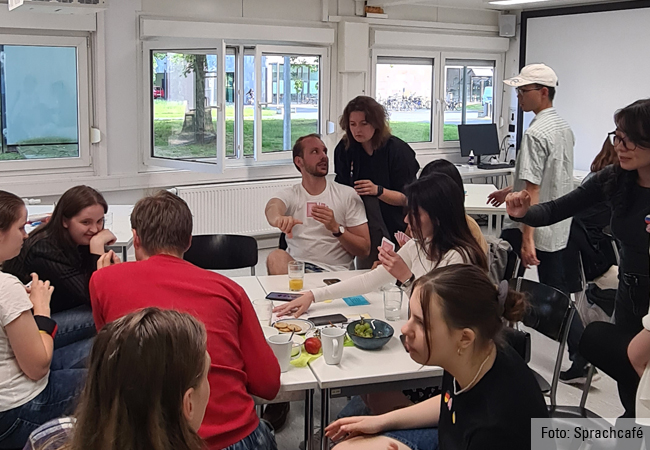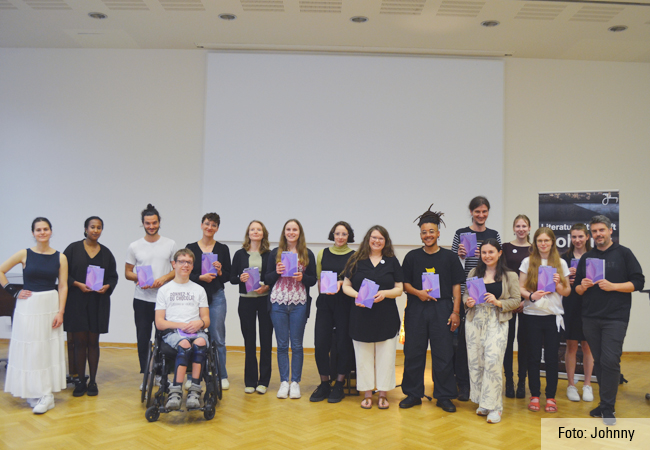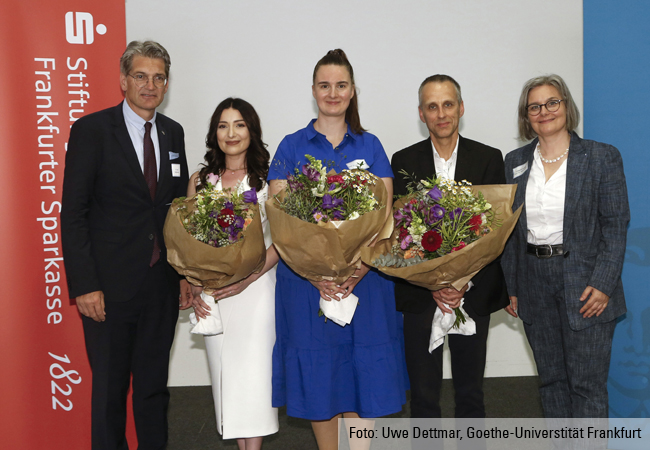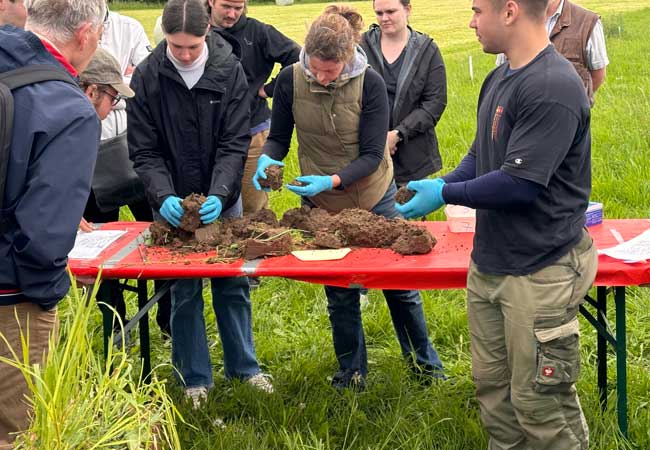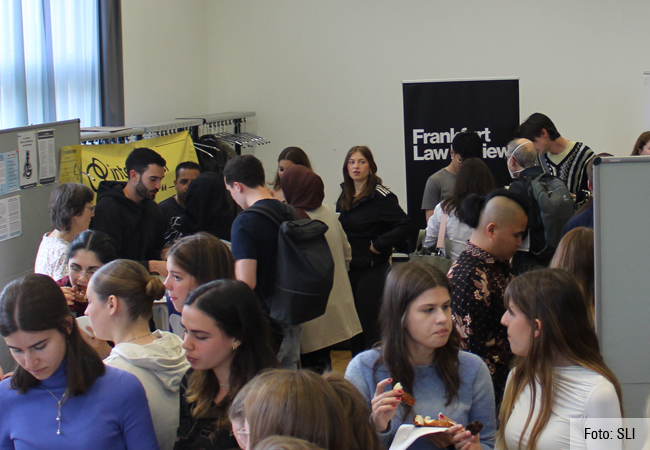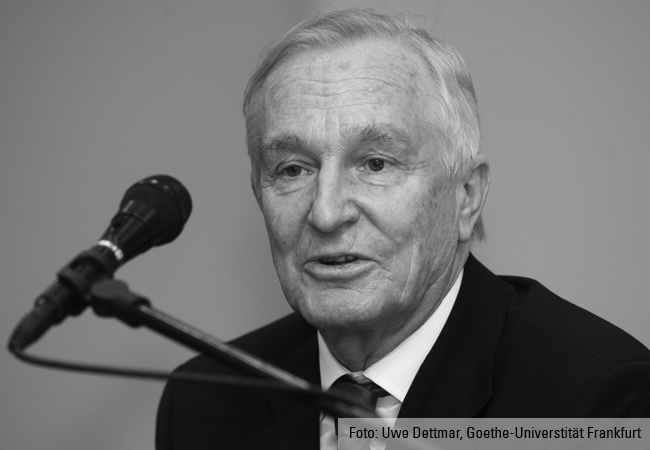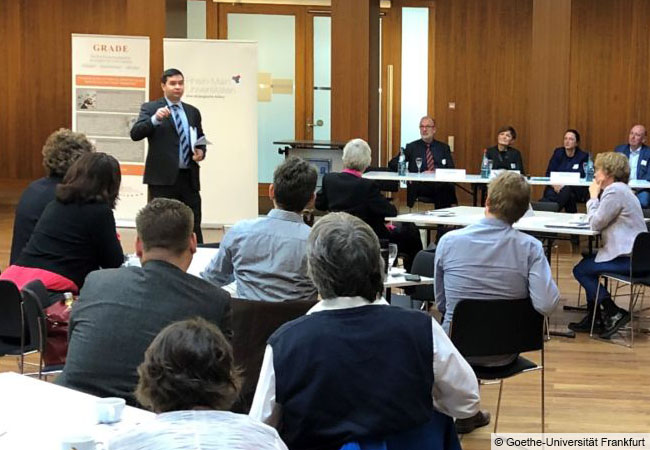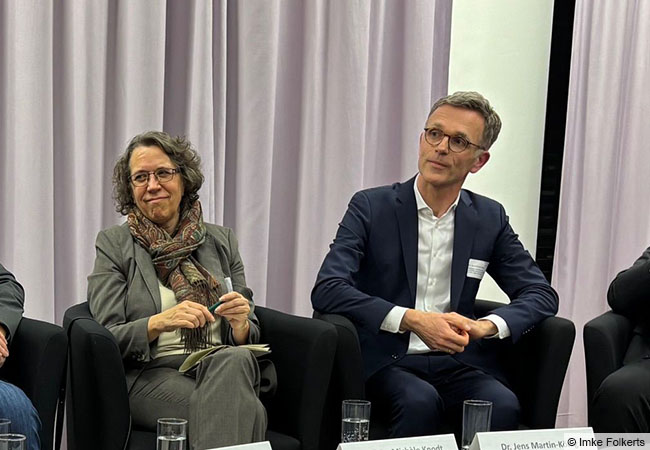Students put their questions about the war in the Middle East to Israeli Consul General Talya Lador-Fresher.
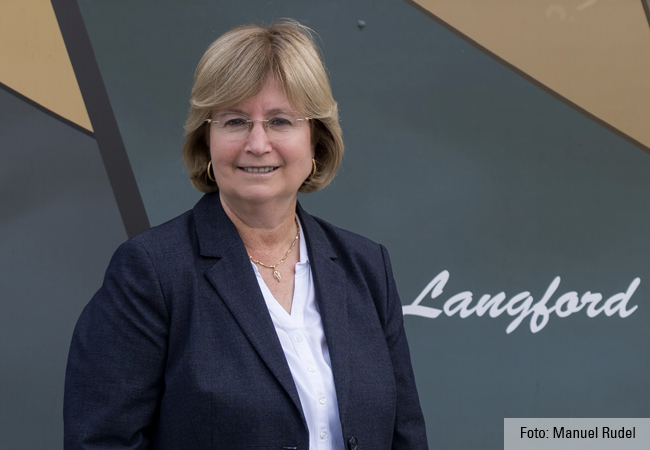
Hamas’ terrorist attacks on Israel and the country’s military action are topics that concern many members of Goethe University Frankfurt, some of whom have family or friends in the region. At the same time, the conflict, its history and its impacts feature in research and teaching at the university.
Prof. Christian Wiese, Director of the Buber-Rosenzweig Institute dedicated to modern and contemporary Judaism and professor in the Faculty of Protestant Theology, had planned an event at the beginning of June at which Talya Lador-Fresher, Israel’s Consul General in Munich, would be on hand to answer questions from students. However, Frankfurt’s municipal authorities learned of a protest against the visit, giving rise to a dynamic situation in which the university’s management no longer saw the safety of either the participating students or the Consul General as guaranteed. In consultation with the security authorities, Goethe University’s management decided to postpone the event to a later date.
The meeting eventually took place on July 8. Two students who wanted to take part in the discussion submitted their questions to the Consul General in writing prior to the rescheduled event, which was supported by the Buber-Rosenzweig Institute. Here are the questions and the answers provided by the Consul General.
Ms. Lador-Fresher, many thanks for being willing to enter into this dialog with us. The first date chosen for the discussion had to be abandoned and the meeting postponed for security reasons. What did this mean to you? The protestors called your offer of a discussion an apology for the actions of the state of Israel. What was your intention when you issued the invitation to the dialog?
Talya Lador-Fresher: The fact that the initial meeting had to be postponed was a huge disappointment. I can understand Goethe University’s concerns for its students and the security considerations relating to the event. At the same time it’s alarming that terror caused the event to be postponed. Terror is not only physical, but also psychological – as in this case, for example, when it becomes impossible to express one’s opinions freely.
That was the precise intention behind the invitation to a discussion, to share experiences and views as an Israeli diplomat, and to talk with the students present about their experiences and thoughts.
Presenting this offer to engage in a debate as an “an apology for the actions of the state of Israel” once again follows the paradigm of applying double standards regarding the state of Israel and its representatives. This starting point makes a dialog almost impossible. Discussions should be dialogs where every participant can speak in a secure setting and, most importantly, can listen to one another.
I’m sure that the terrible events of October 7 must be ingrained into the consciousness of all students, of everyone in Germany. Anyone who forgets, suppresses the memory of, or denies this horrific massacre, is reversing the positions of perpetrator and victim.
Do you think it’s possible to enter into a genuine dialog at all under these conditions? You have a lot of experience with conflict-laden meetings. Have you any advice for students on how to achieve a constructive interaction with people who behave aggressively, in a way that really helps both sides?
In general, all discussions require certain conditions. If one party behaves aggressively, a discussion will be rendered near impossible. To me, it’s important to say at this point that the people who protested at Goethe University Frankfurt on June 4, reproducing antisemitic resentment and hate of Israel, have no interest in a genuine dialog.
At demonstrations like the one held here on June 4, antisemitic and anti-Israeli opinions are frequently reproduced that are not based on serious facts and sources. Information from the terror organization Hamas for example, is not based on a reliable and trustworthy source. This is illustrated, for instance, by the events surrounding the explosion in the parking lot of the al-Ahli Hospital on October 17, 2023. The blast killed and injured Palestinians who were sheltering there. The reports about the cause of the explosion varied widely. Hamas blamed the blast on an Israeli airstrike. By contrast, Israeli, US, French, British and Canadian intelligence sources show it was caused by a failed rocket fired from the Gaza Strip by Palestinian Islamic Jihad. Just a few hours after the explosion and while it was still being investigated, Israel was already being held responsible at so-called “pro-Palestinian” demonstrations, which in many cases were actually “pro-terror” demonstrations. Even after the failed rocket launch from the Gaza Strip was found to be the real cause of the explosion, there was little to now correction of the misinformation that had been put out earlier.
If there’s a mutual willingness and patience to listen to one another without prejudice, I have a high opinion even of potentially conflict-laden discussions. In the past, I’ve frequently conducted challenging discussions with people who didn’t share my opinions. I learned a lot from these discussions, which I still find useful today.
The calls to break off academic contacts with Israeli universities are getting louder. How important are academic exchanges and interactions for German-Israeli relations? Against this background, how do you view the demand voiced by proponents of the BDS movement to terminate these relations? With so much debate on Israel in Germany: Do you think Israel is being accurately presented? Do you encounter incorrect ideas or gaps that have to be rectified?
To be honest, I cannot understand this development; the growth in the BDS movement following the on October 7 massacre by Hamas is incomprehensible. Should the reaction to the attack be to boycott the people who themselves became victims of this barbaric terrorist attack, who were at that moment defending themselves and Western values?
Ceasing academic contacts would be disadvantageous for everyone – first and foremost for German and Israeli universities, of course, but even before that for global civil society. One example of successful cooperation is the recently founded Frankfurt-Tel Aviv Center for the Study of Religious and Interreligious Dynamics here at this university, which takes a multi-humanities approach to the three Abrahamic religions. The age in which we live in clearly illustrates just how important such a holistic approach is.
Beyond that, Israel functions as a role-model in many areas. As such, numerous Israeli universities can be found among the top 100 in the ShanghaiRanking. It’s appalling that Israeli professors now often face difficulties when holding classes abroad or publishing their scientific articles in journals because of the BDS movement.
At this point I’d like to quote a poem by Johann Wolfgang von Goethe:
“He whose vision cannot cover
History’s three thousand years,
Must in outer darkness hover,
Live within the day’s frontiers.”
In 2019, the German Rectors’ Conference [Hochschulrektorenkonferenz] clearly committed itself to the International Holocaust Remembrance Alliance (IHRA) definition of antisemitism and to its application in member universities. The consistent implementation of this resolution and application of the IHRA definition in effect prohibit universities from complying with the BDS demands to stop academic contact with Israeli universities.
Regarding the way Israel is presented in Germany, let me come back to the perpetrator-victim reversal I already mentioned. What happened on October 7 must not be forgotten. Israel was attacked by Hamas, a wing of the Muslim Brotherhood supported by Iran. More than 1,200 people in Israel, most of them civilians, were brutally and horrifically murdered by a terror organization that also abuses its own civilian population as human shields. More than 250 more people were taken hostage. Unfortunately, I frequently find that the cause of the current situation – the attacks on Israel – is ignored or even completely distorted during discussions about Israel. I, too, sympathize with the civilians in the Gaza Strip and I understand very well that this compassion is being addressed. It must be possible to express sympathy and simultaneously to call the current situation for what it is: right now Israel is defending the democratic values of the West against Hamas from the Gaza Strip and Hezbollah from Lebanon.
Antonia Steins and Malte Blaha asked the questions.


